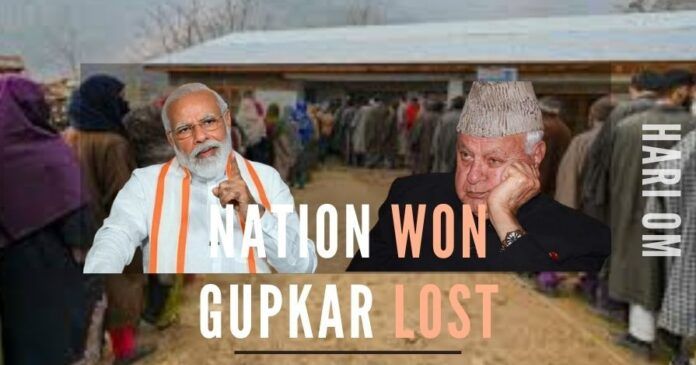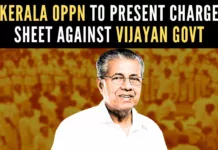
DDC polls in J&K – BJP has potent reasons to celebrate its performance
The results of the much-talked-about and keenly-watched first-ever elections across the nation, nay across the world, to constitute 20 District Developments Councils (DDCs) in Union Territory of Jammu & Kashmir (UTJK) were declared on December 22. Ever since, Bharatiya Janata Party (BJP) and Farooq Abdullah-led votary of restoration of August 5, 2019, politico-constitutional status People’s Alliance for Gupkar Declaration (PAGD) have been in a celebration mode. PAGD is a conglomeration of seven Kashmiri parties – National Conference (NC), People’s Democratic Party (PDP), People’s Conference (PC), J&K People’s Movement (JKPM), Awami National Conference (ANC), CPI and CPI-M.
BJP contested elections on such planks as national integration and development and PAGD on such slogans as Article 35A, Article 370, J&K autonomy and secularism. BJP has been claiming that the people of UTJK ratified the August 5, 2019 abrogation of Articles 35A and 370, abrogation of J&K’s special status, creation of UT of Ladakh and conversion of the leftover J&K also into UT. The leadership of PAGD also has been claiming that the victory of the PAGD candidates was a vindication of their stand that all the August 2019 actions of the Narendra Modi Government were “undemocratic, illegal and unconstitutional” and that the mandate “is for the restoration of the pre- August 5, 2019, politico-constitutional status.”
The claim of the PAGD leaders that the DDC poll result is a “referendum against the August 2019 Parliament’s legislation” is as untenable as it is amusing and ridiculous.
BJP has potent reasons to celebrate its performance. One, it will head six DDCs on its own strength in Jammu province’s Kathua, Samba, Jammu, Udhampur, Reasi and Doda districts. Two, it emerged as the single-largest party for the first time in this region. It won 75 seats, including 72 out of 140 in Jammu province and three in Kashmir. BJP created a history of sorts when three of its Muslim candidates won in Kashmir. Three, it also turned out to be the biggest vote-catcher. It got 7,08,7143 votes (24.82%), including three per cent Kashmir. The number of total votes polled was 28,55,509. BJP had fielded candidates in 183 territorial constituencies.
However, the DDC polls verdict also sent a clear message to BJP. Its leadership has to sit up to find why it lost substantial ground in Jammu’s Kishtwar, Ramban, Reasi and Sunderbani-Kalakot-Nowshera belt in Rajouri district? It could win only 16 out of 56 seats. MoS in PMO Mr Jitendra Singh has been representing Kishtwar, Ramban and Reasi – apart from Kathua, Udhampur and Doda districts – in Lok Sabha since 2014. Besides, three of the BJP ministers in the PDP-BJP coalition government were from Kishtwar, Doda and Reasi districts. As for Sunderbani-Kalakot-Nowshera belt, it was represented in the now-dissolved assembly by two BJP MLAs, including the present J&K BJP president. One of the BJP MLAs was also a cabinet minister in the PDP-BJP coalition government. Had the BJP repeated its 2019 performance, the BJP’s tally in Jammu province could have been almost 90.
The claim of the PAGD leaders that the DDC poll result is a “referendum against the August 2019 Parliament’s legislation” is as untenable as it is amusing and ridiculous. The fact of the matter is that their referendum balloon was punctured even in Kashmir by their co-religionists. How many seats the PAGD constituents? It won 110 seats. NC won 67seats, 42 in Kashmir and 25 in Jammu; PDP 27, 26 in Kashmir and 1 in Jammu; PC 8, all in Kashmir; CPI-M 5, all in Kashmir; and JKPM 3, also all in Kashmir. How many votes the PAGD candidates got? The vote-share of PAGD, which had fielded 220 candidates, is 22.8% – 1.8% less than the BJP’s vote share. NC, which dominated Kashmir’s political scene for 88 years and ruled J&K for decades, got 4,47,099 votes (16.3%) votes; PDP, which ruled J&K for almost seven years, got 1,13,175 votes (a paltry 3.9%) and PC got two per cent.
The remaining 47.62% votes went to independent candidates and candidates belonging to other parties, including Congress, J&K Apni Party (JKAP), J&K National Panthers Party (JKNPP), Bahujan Samaj Party and People’s Democratic Front (PDF). Congress won 26 seats, 17 in Jammu and 9 in Kashmir; JKAP 12 and 9 in Kashmir and 3 in Jammu; JKNPP and BSP won 2 and 1 seat, respectively, in Jammu; and PDF 3, all in Kashmir. Independent candidates, who emerged victorious in 50 territorial constituencies, 31 in Kashmir and 19 in Jammu province, alone got over 8.80 lakh votes. Interestingly, the newly-founded JKAP got more votes than PDP. JKAP got 1,51,331 votes, as against the PDP’s vote share of 3.9%.
The BJP, in fact, opened its account in the Srinagar district and it could be construed as the PAGD’s biggest defeat.
It needs to be underlined that the PAGD leadership had tried to the hilt to motivate Kashmiri voters to come out in large numbers and vote for the PAGD candidates to strengthen its hands. They had repeatedly told them that their vote for the PAGD candidates would be a vote against those who “snatched Article 35A and Article 370 from them” and “abrogated J&K’s special status”. The statistics concerning the election results tell a different story. The statistics clearly suggest that the voters in J&K upset the apple-cart of the PAGD. That the voters upset its applecart could also be seen from the nature of the verdict. While the BJP on its strength will head six DDCs in Jammu province, NC on its own strength or PDP on its strength is not in a position to head even one of the ten DDCs in Kashmir. Of course, the ragtag PAGD would head six DDCs in the Kashmir’s Kupwara, Ganderbal, Budgam, Pulwama, Kulgam and Anantnag districts.
The political status of the PAGD and the NC could also be determined from the fact that the voters in Srinagar district, which is represented by Farooq Abdullah in the LS and is the headquarter of the PAGD and the NC, decimated the Abdullah-led formation. The PAGD could win only a paltry 2 seats in Srinagar district out of a total of 14 seats. The remaining 12 seats were won by independent candidates and the parties like the BJP and the JKAP. The BJP, in fact, opened its account in the Srinagar district and it could be construed as the PAGD’s biggest defeat.
In the remaining eight districts, four each in Jammu province and Kashmir, it’s the independent and Congress candidates who will play the role of king-makers. As far as the Congress itself is concerned, it’s not in the reckoning even in one of the 20 districts of J&K. PAGD and Congress would be in a position to head DDCs in the Jammu’s Ramban, Kishtwar and Rajouri districts provided they help each other, which is extremely likely.
Note:
1. The views expressed here are those of the author and do not necessarily represent or reflect the views of PGurus.
- ‘Kashmir My core constituency’: Revisiting July 12, 2003 to understand politics, Omar Abdullah-style - March 15, 2024
- Total deviation from traditional approach: Seven takeaways from PM Modi’s March 7 Srinagar visit - March 9, 2024
- Status of political parties: Why is further J&K reorganization imperative? - March 1, 2024











[…] Centre is offering,” said CPI(M) leader Mohammad Yousuf Tarigami, a spokesperson of the six-party People’s Alliance for Gupkar Declaration (PAGD) and among the 14 leaders […]
Most important thing is polls were peaceful. No violence and turn out was good. BJP has become a power in the state and Abdullas and muftis are slowly disappearing from the main political scene. Independents winning in big numbers shows that people welcome change. BJP did a great thing in giving voting rights to people who were denied for almost seventy years. let us welcome all the Kashmiri Hindus and Sikhs who were expelled from the state and help them get settled and start some business. let us renovate all holy Hindu places and make the state a tourist paradise all over again. it is very important ED goes after the Abdullas and Muftis and others who have become almost like Nawabs with looted money of our taxpayers.
Excellent and reassuring analysis from an expert analyst on ground. Thanks Prof Hari Om!